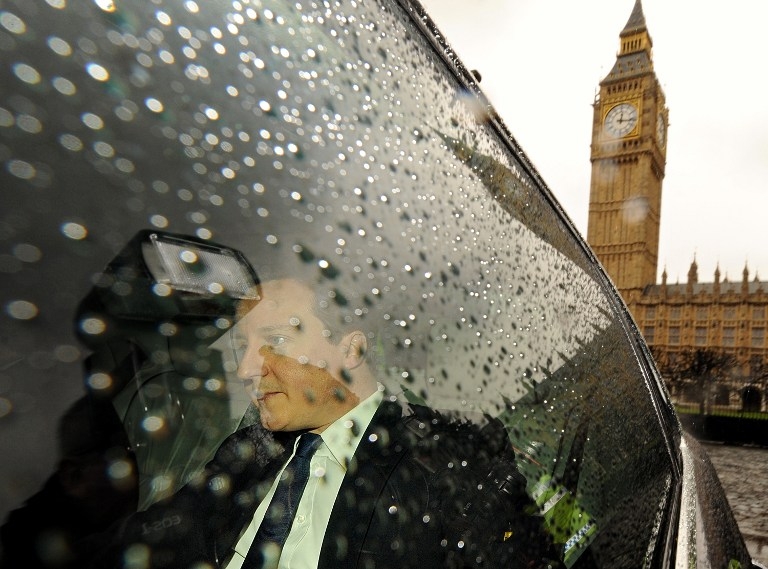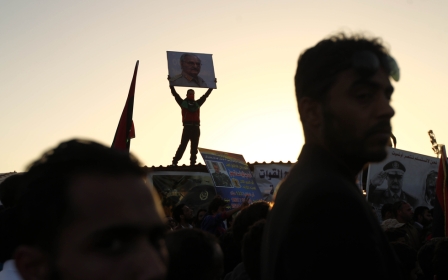Libya: David Cameron's Iraq

Very few political reputations, not even Tony Blair’s, have fallen as far and as fast as David Cameron.
It’s less than 18 months since Cameron pulled off a stunning general election victory against the odds. At that moment, the Tory leader appeared invincible.
Instead, he will go down in history as the British prime minister who triggered Brexit by mistake. This week, his decision to quit early as an MP has brought accusations of lying – and ugly comparisons with Tony Blair for profiteering after leaving public office.
The committee has no doubt that 'former prime minister David Cameron was ultimately responsible for the failure to develop a coherent Libya strategy'
Today’s report from the House of Commons foreign affairs committee (FAC) into Britain’s intervention into Libya five years ago marks another nail into the coffin of Cameron’s collapsing reputation.
The report is emphatic that the British/French intervention was an unmitigated disaster, and insists that Cameron should take personal responsibility.
The FAC accused the Cameron government of overstating the threat Muammar Gaddafi posed to civilians, failing to understand how Libya worked, and of pursuing "an opportunistic policy of regime change".
Worse still, it states that Britain failed to develop "a strategy to support and shape post-Gaddafi Libya".
According to the FAC, the consequence of British incompetence could hardly have been more dire: "Political and economic collapse, inter-militia and inter-tribal warfare, humanitarian and migrant crises, widespread human rights violations, the spread of Gaddafi regime weapons across the region and the growth of [the Islamic State group] in North Africa.’
And the FAC has no doubt that "former prime minister David Cameron was ultimately responsible for the failure to develop a coherent Libya strategy".
Fundamental falsehoods
Cameron has often been compared with his predecessor Tony Blair, and with good reason. Both men shared the same modernising analysis, the same style of government, and the same contempt for traditional political structures.
There is another comparison. Both men were truly dreadful war leaders - up there among British prime ministers with Anthony Eden (Suez humiliation of 1956), Neville Chamberlain (Munich) and Lord North (loss of the American colonies).
Just as with Iraq, a fundamental falsehood lay at the heart of the decision to invade Libya
Blair led Britain into the catastrophe of Iraq. Cameron, along with French president Nicolas Sarkozy, led Britain into our disastrous Libyan intervention.
Libya was David Cameron’s Iraq. Just as with Iraq, a fundamental falsehood lay at the heart of the decision to invade. Cameron wrongly claimed that Gaddafi was about to commit a genocide, while Blair mistakenly stated that Saddam Hussein possessed weapons of mass destruction.
Catastrophic intelligence failures were at the heart of each disaster. The FAC notes that "the UK government was unable to analyse the nature of the rebellion in Libya due to incomplete intelligence and insufficient institutional insight …it selectively took elements of Muammar Gaddafi’s rhetoric at face value and it failed to identify the militant extremist element in the rebellion".
There is a very troubling echo here of the British intelligence mistakes in Syria, where our officials also failed to understand the way that al-Qaeda and other jihadist groups would come to dominate the uprising.
However, the failure of British intelligence to understand Libya is especially puzzling because Britain enjoyed a specially close relationship with the country’s pre-revolution intelligence chief Musa Kusa - as evidenced by the correspondence with senior SIS officer Sir Mark Allen over the kidnap and subsequent torture of AbdulHakim Belhaj.
Third, the failure to plan for the future was every bit as notable in Libya as in Iraq.
And much less excusable. By the time we intervened in Libya in 2011, Britain had had plenty of time to absorb the lessons of the Iraq war. We were incapable of doing so. A new security architecture was in place in the shape of Cameron’s much-vaunted National Security Council, but it proved to be no more use than Blair’s notorious "sofa government".
Ironically, Blair emerges as one of the good guys in the Libyan fiasco, or so the committee seems to assert.
The former prime offered himself as a linkman with the Gaddafi family, opening up the possibility of a political rather than a military solution to the crisis. Unfortunately, the FAC concludes, Cameron lacked the wit to exploit Blair’s Gaddafi connection.
Playing both sides
Most of the conclusions of the FAC report are fair enough. However, the FAC itself shows grievously faulty judgment when it comes to current events.
‘The Government of National Accord (GNA) it declares, ‘is the only game in town.’
This is nonsense. The GNA – yet another doomed British initiative of dubious legality - is in shambles. It commands very little allegiance in the east of Libya (where the British ambassador is persona non grata).
Following a series of takeovers last weekend, the eastern government’s General Khalifa Haftar now controls approaching 80 percent of Libya’s oil production.
Curiously, British special forces are on both sides of this political schism at the same time, helping the forces loyal to the GNA in Misrata, and helping Haftar bomb pro-Tripoli Islamist militias in Benghazi.
Not even the smoothest of Foreign Office tongues can remotely claim that helping Haftar is helping the GNA in Tripoli or working towards the unity of the country. Rather this is a policy aimed at the de-facto partition of Libya.
Hindsight is easy and the FAC report takes full advantage. So perhaps it is worth recalling that only a dozen MPs voted against intervention in Libya five years ago. One of them was the Labour leader Jeremy Corbyn.
It is past time that Labour critics such as Hilary Benn acknowledged that Corbyn has consistently shown superb judgment on foreign policy issues. Had he been prime minister for the last 15 years, Britain would not have been drawn into the death trap of Helmand province, the horror of Iraq or the calamity of Libya.
As Labour members cast their votes in the Labour leadership contest, they should bear that in mind.
- Peter Oborne was named freelance writer of the year 2016 by the Online Media Awards for his reporting for Middle East Eye. With MEE colleague Nawal Al-Maghafi, he is among the few correspondents to have ventured into war-torn Yemen in recent months.
The views expressed in this article belong to the author and do not necessarily reflect the editorial policy of Middle East Eye.
Photo: British Prime Minister David Cameron leaves after addressing the House of Commons on Libya in London, on 18 March 2011 (AFP)
This article is available in French on Middle East Eye French edition.
New MEE newsletter: Jerusalem Dispatch
Sign up to get the latest insights and analysis on Israel-Palestine, alongside Turkey Unpacked and other MEE newsletters
Middle East Eye delivers independent and unrivalled coverage and analysis of the Middle East, North Africa and beyond. To learn more about republishing this content and the associated fees, please fill out this form. More about MEE can be found here.





